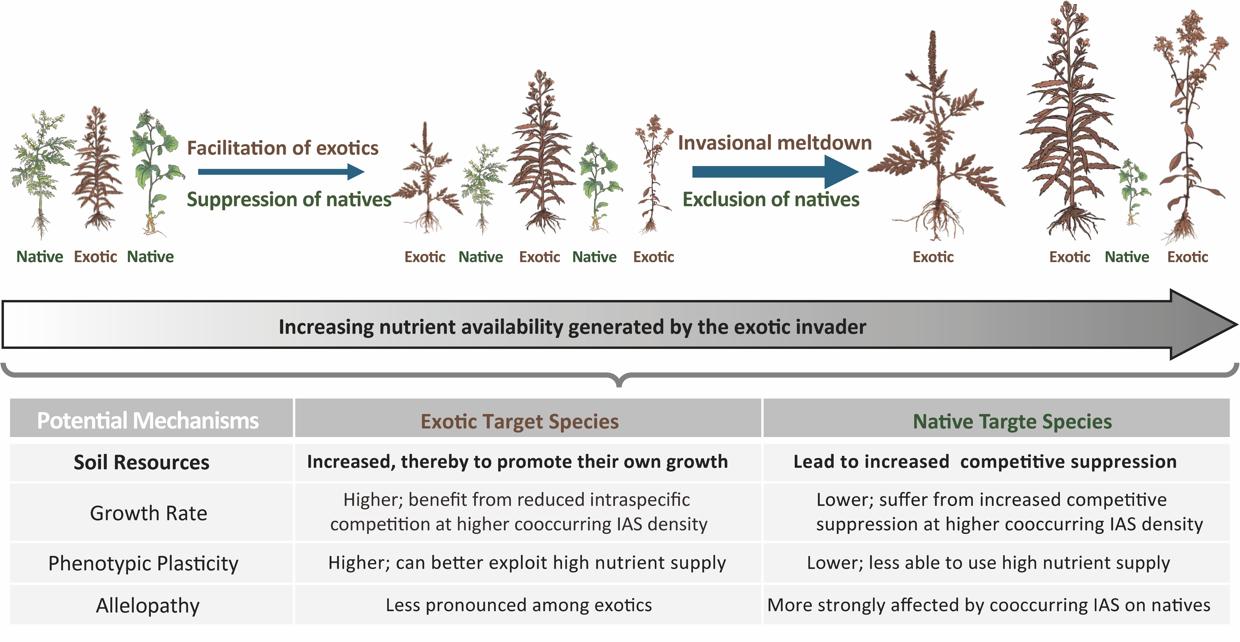近日,我校资源与环境学院孙燕教授团队与中国科学院武汉植物园黄伟研究员团队在国际生态学期刊Ecology上在线发表了题为“Increasing and fluctuating resource availability enhances invasional meltdown”的论文,揭示了增加土壤养分会导致入侵种提高对其他外来植物生长的促进作用,同时加剧其对本地植物的竞争影响。基于此,团队提出了“资源驱动的入侵崩溃-本地抑制”假说(RIMIN),为生物入侵机制的研究提供了新的视角。
人类活动加剧全球范围内多物种同时入侵。入侵崩溃,即外来入侵生物间的相互促进现象,导致入侵加剧。目前,入侵崩溃的具体机制尚不清楚,但可能与生产力和养分循环的加速密切相关。随着全球氮沉降加剧和农业扩展,入侵崩溃现象可能会愈加严重。因此,探究资源在群落水平上调控入侵崩溃的潜在机制尤为迫切。
通过开展中宇宙生态系统实验,模拟了8种外来植物和8种欧亚本地植物在不同密度的入侵植物小蓬草(Conyza canadensis)下的生长情况。研究发现,在低养分处理下,小蓬草的相对丰度与外来目标物种的平均个体生物量呈弱的正相关,与本地目标物种呈显著负相关;在高养分处理下,小蓬草的相对丰度与本地目标物种生物量显著负相关,但与外来目标物种显著正相关;波动养分条件下,外来物种的生物量优势更加显著。

图1 资源波动对入侵植物与外来目标物种和本地目标物种之间相对丰度的相互作用结果
以上研究结果表明增加土壤养分变化(增加和波动)会导致入侵植物提高对其他外来植物的促进作用,同时加剧其对本地植物的竞争影响。基于此,提出了“资源驱动的入侵崩溃-本地抑制”假说(Resource-driven Invasional Meltdown and Inhibition of Native hypothesis - RIMIN)。上述研究为生物入侵机制的研究提供了新的视角。

图2 资源波动驱动的入侵崩溃-本地抑制(RIMIN)假说
华中农业大学孙燕教授和博士生任芝坤为论文的共同第一作者,中国科学院武汉植物园黄伟研究员为论文的通讯作者。瑞士弗里堡大学Heinz Müller-Schärer教授,美国蒙大拿大学Ragan M. Callaway教授以及德国康斯坦茨大学Mark van Kleunen教授等参与了该项研究工作。
【英文摘要】
Exotic plant invaders can promote others via direct or indirect facilitation, known as “invasional meltdown.” Increased soil nutrients can also promote invaders by increasing their competitive impacts, but how this might affect meltdown is unknown. In a mesocosm experiment, we evaluated how eight exotic plant species and eight Eurasian native species responded individually to increasing densities of the invasive plant Conyza canadensis, while varying the supply and fluctuations of nutrients. We found that increasing density of C. canadensis intensified competitive suppression of natives but intensified facilitation of other exotics. Higher and fluctuating nutrients exacerbated the competitive effects on natives and facilitative effects on exotics. Overall, these results show a pronounced advantage of exotics over native target species with increased relative density of C. canadensis under high nutrient availability and fluctuation. We integrate these results with the observation that exotic species commonly drive increases in soil resources to suggest the Resource-driven Invasional Meltdown and Inhibition of Natives hypothesis in which biotic acceleration of resource availability promotes other exotic species over native species, leading to invasional meltdown.
